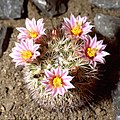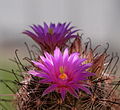Cochemiea
| Cochemiea | |
|---|---|

| |
| Cochemiea macdougallii | |
| Scientific classification | |
| Kingdom: | Plantae |
| Clade: | Tracheophytes |
| Clade: | Angiosperms |
| Clade: | Eudicots |
| Order: | Caryophyllales |
| Family: | Cactaceae |
| Subfamily: | Cactoideae |
| Tribe: | Cacteae |
| Genus: | Cochemiea (K.Brandegee) Walton[1] |
| Type species | |
| Cochemiea halei | |
| Species | |
| Synonyms | |
| |
Cochemiea is a genus of cactus.[2] The group was previously synonymized with Mammillaria, until molecular phylogenetic studies determined that—when broadly circumscribed—Mammillaria is not monophyletic; thus, Cochemiea has been accepted as a distinct genus.[3]
The Cactaceae family, as a whole, is the fifth most-endangered plant or animal family taxon, globally, as evaluated by the International Union for the Conservation of Nature (IUCN).[4] The reasons for this are varied, ranging from climate change and habitat loss, in some regions, to the illegal harvesting (poaching) of wild cacti for personal collections or sale on the black market, or blatantly sold, as-is, fresh from the wild. As these plants are naturally slow growers, wild cactus growth and reproduction rates may not meet the rate at which certain populations of species are being poached, thus creating gaps in the wild populations and risking complete regional depletion or extinction.
Taxonomy
[edit]A 2021 molecular phylogenetic study of the "mammilloid clade", which included the genera Cochemiea, Coryphantha, Cumarinia, Escobaria, Mammillaria, Neolloydia and Ortegocactus, showed that it consisted of four monophyletic groups, which the authors re-circumscribed into four genera: Cumarinia; Mammillaria, with a reduced number of species; Coryphantha, expanded to include species previously placed in Mammillaria and Escobaria; and Cochemiea, expanded to include a large number of species previously placed in Mammillaria, as well as Neolloydia conoidea.[3]
| Mammilloid clade |
| ||||||||||||||||||
Species
[edit]In 2021, Breslin, Wojciechowski and Majure placed the following species in the genus, some already placed there and some moved from Mammillaria, Neolloydia, Neomammillaria and Ortegocactus.[3] As of December 2022[update], Plants of the World Online accepted in the genus the species moved by Breslin et al.[2]
| Image | Scientific name | Distribution |
|---|---|---|
 |
Cochemiea albicans (Britton & Rose) P.B.Breslin & Majure | Mexico (Baja California) |
| Cochemiea angelensis (R.T.Craig) P.B.Breslin & Majure | Mexico | |
 |
Cochemiea armillata (K.Brandegee) P.B.Breslin & Majure | Mexico (Baja California Sur) |
 |
Cochemiea barbata (Engelm.) Doweld | Mexico (Chihuahua, Durango) |
 |
Cochemiea blossfeldiana (Boed.) P.B.Breslin & Majure | Mexico (Guadalupe, Baja California) |
 |
Cochemiea boolii (G.E.Linds.) P.B.Breslin & Majure, | Mexico (Sonora) |
| Cochemiea bullardiana (H.E.Gates) P.B.Breslin & Majure, | Mexico (Baja California) | |
 |
Cochemiea capensis (H.E.Gates) Doweld | Mexico (Baja California Sur, Sonora) |
| Cochemiea cerralboa (Britton & Rose) P.B.Breslin & Majure | Mexico (Baja Carlifornia Sur). | |
 |
Cochemiea conoidea (DC.) P.B.Breslin & Majure | Texas to NE. Mexico (to Veracruz) |
 |
Cochemiea dioica (K.Brandegee) Doweld | S. California to NW. Mexico |
| Cochemiea estebanensis (G.E.Linds.) P.B.Breslin & Majure, | Mexico (Island San Esteban) | |
 |
Cochemiea fraileana (Britton & Rose) P.B.Breslin & Majure | Mexico (Baja California Sur). |
| Cochemiea goodridgei (Scheer ex Salm-Dyck) P.B.Breslin & Majure | Mexico (Baja California). | |
 |
Cochemiea grahamii (Engelm.) Doweld | SE. California to W. Texas and Mexico (Baja California Norte to Chihuahua) |
 |
Cochemiea guelzowiana (Werderm.) P.B.Breslin & Majure | Mexico (Durango, Coahuila, Nuevo León) |
 |
Cochemiea halei (K.Brandegee) Walton | Mexico (Baja California) |
 |
Cochemiea hutchisoniana (H.E.Gates) P.B.Breslin & Majure | Mexico (Baja California) |
 |
Cochemiea insularis (H.E.Gates) P.B.Breslin & Majure | Mexico (Baja California) |
 |
Cochemiea macdougallii (Alexander) P.B.Breslin & Majure | Mexico (Oaxaca) |
 |
Cochemiea mainiae (K.Brandegee) P.B.Breslin & Majure | S. Arizona to NW. Mexico |
 |
Cochemiea maritima H.E.Gates ex. Shurly | Mexico (W. Central Baja California) |
 |
Cochemiea multidigitata (Radley & G.E.Linds.) P.B.Breslin | Mexico (Sonora). |
 |
Cochemiea palmeri (J.M.Coult.) P.B.Breslin & Majure | Mexico (Baja California) |
 |
Cochemiea phitauiana (E.M.Baxter) Doweld | Mexico (Baja California). |
| Cochemiea pondii (Greene) Walton | Mexico (Island Cedros) | |
 |
Cochemiea poselgeri (Hildm.) Britton & Rose | Mexico (Baja California Sur) |
 |
Cochemiea saboae (Glass) Doweld | Mexico (E. Sonora, W. Chihuahua) |
 |
Cochemiea schumannii (Hildm.) P.B.Breslin & Majure | Mexico (Baja California Sur). |
 |
Cochemiea setispina Walton | Mexico (C. Baja California). |
 |
Cochemiea tetrancistra (Engelm.) P.B.Breslin & Majure | SW. U.S.A. to NW. Mexico |
 |
Cochemiea theresae (Cutak) Doweld | Mexico (Durango, Zacatecas). |
| Cochemiea thomasii García-Mor. & al. | Mexico (Sinaloa) | |
 |
Cochemiea thornberi (Orcutt) P.B.Breslin & Majure | S. Arizona to Mexico (Sonora). |
| Cochemiea viridiflora (Britton & Rose) P.B.Breslin & Majure | Arizona to SW. New Mexico. | |
 |
Cochemiea wrightii (Engelm.) Doweld | E. Arizona to W. Texas and N. Mexico. |
References
[edit]- ^ "Cochemiea (K.Brandegee) Walton", The International Plant Names Index, retrieved 2022-03-05
- ^ a b "Cochemiea (K.Brandegee) Walton", Plants of the World Online, Royal Botanic Gardens, Kew, retrieved 2022-03-05
- ^ a b c Breslin, Peter B.; Wojciechowski, Martin F. & Majure, Lucas C. (2021), "Molecular phylogeny of the Mammilloid clade (Cactaceae) resolves the monophyly of Mammillaria", Taxon, 70 (2): 308–323, doi:10.1002/tax.12451, S2CID 233885318
- ^ Goettsch, Bárbara; Hilton-Taylor, Craig; Cruz-Piñón, Gabriela; Duffy, James P.; Frances, Anne; Hernández, Héctor M.; Inger, Richard; Pollock, Caroline; Schipper, Jan; Superina, Mariella; Taylor, Nigel P.; Tognelli, Marcelo; Abba, Agustín M.; Arias, Salvador; Arreola-Nava, Hilda J. (2015-10-05). "High proportion of cactus species threatened with extinction". Nature Plants. 1 (10): 15142. doi:10.1038/nplants.2015.142. hdl:11336/11280. ISSN 2055-0278. PMID 27251394.
